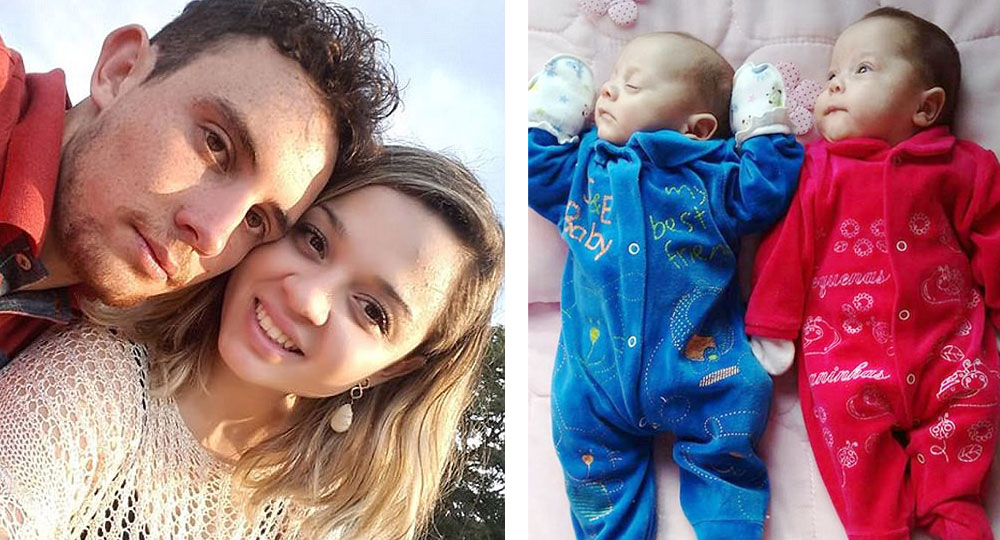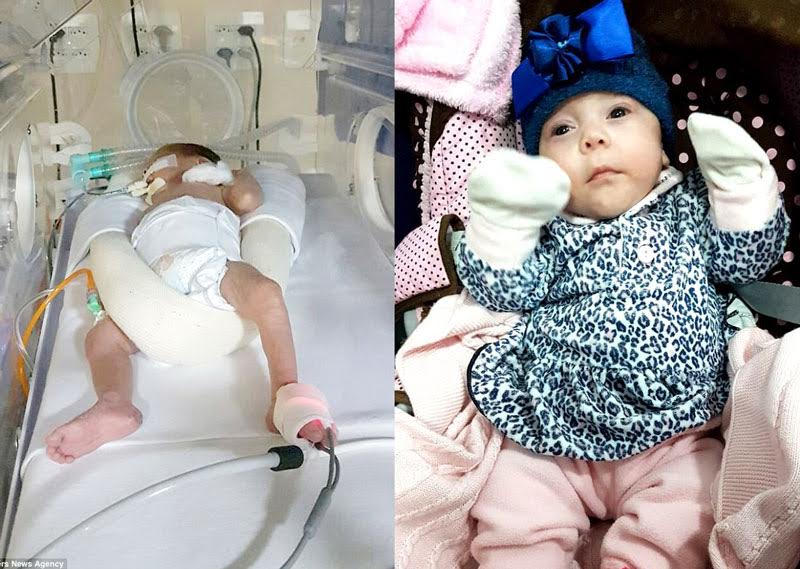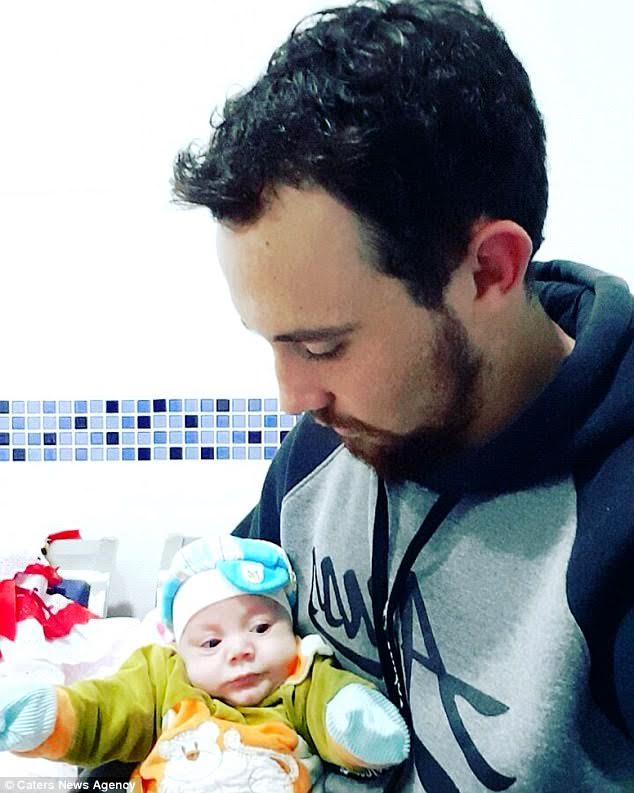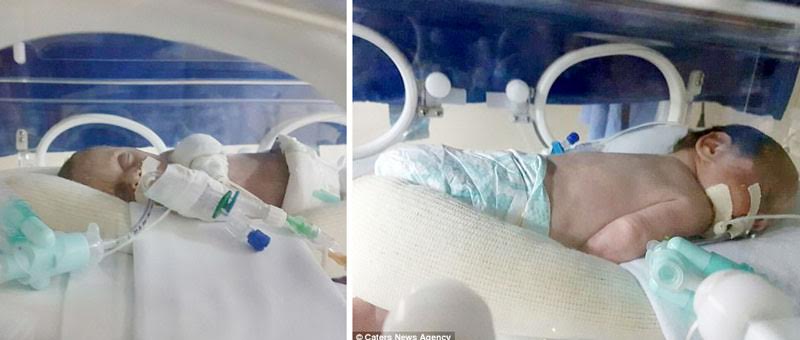
A brain dead pregnant woman was kept alive for 123 days - the longest time ever - before delivering twins by emergency caesarean section.
Frankielen da Silva Zampoli Padilha, 21, from Campo Largo in south Brazil, died during pregnancy in October last year after suffering a stroke.
Doctors decided to save the nine-week-old embryos after their hearts continued to beat inside their mothers’ womb.
Staff at Nosso Senhora do Rocio hospital decorated the space around Ms Padilha’s bed with pictures of her, sung to the unborn children and talked to the growing infants in an effort to substitute their mother’s love.
The babies’ father has described their birth as a ‘miracle’ after doctors said they had no hope of surviving.

‘They were clinging to life’
Ms Padilha died nine weeks into her pregnancy in October last year after suffering a cerebral haemorrhage. Her ventilator was switched off in February.
The twins’ father, Muriel Padilha, 24, has described their birth as a ‘miracle’ after doctors initially told him there was no hope of them surviving.
Dr Dalton Rivabem, head of neurological ICU at the hospital, said: ‘We did an ultrasound on the embryos thinking they would be failing in the womb but to our surprise they were clinging to life.
‘Frankielen’s organs were all intact and working as if she was still with us. We took the decision to keep her alive to save her unborn children. And every day we watched them grow normally.’
Dr Rivabem sought help from a doctor in Portugal who had handled a similar case where a foetus gestated for 107-days before being born.
He said: ‘There have been other cases, but ours is the longest one with 123 days - four months, and we started with embryos at two months and delivered twins.
‘One of our main concerns was to keep the organ functions continual for the babies to grow and develop.’
What is a cerebral haemorrhage?
A cerebral haemorrhage occurs when a diseased blood vessel in the brain bursts and leaks into the organ.
This can lead to a rapid build-up of pressure, resulting in death.
They make up around 15 to 20 per cent of all strokes.
Causes include high blood pressure, head trauma, infections, tumours and blood clotting abnormalities or deficiencies.
Symptoms are sudden, severe headache; tingling, weakness or facial paralysis; reduced vision; loss of balance; difficulty speaking; and impaired alertness.
Treatment may include surgery or medication to relieve pressure.
‘Frankielen has appeared to me on many occasions’
Ana Vitoria was born weighing 1.4 kg while her brother Asaph came in at 1.3 kg. Their health was comparable to that of premature babies of the same age.
The newborns were kept in incubators for three months and are now being looked after by Frankielen’s mother, Angela Silva, while Mr Padilha works.
Mrs Silva said: ‘I’m so proud of my daughter. It’s been hard losing her but she was a warrior right until the end, protecting her beautiful children and giving them life until the day she finally died.’

Mr Padilha, who had been with his wife for six years, said: ‘Frankielen has appeared to me on many occasions especially when I was despairing and crying out for God to bring her back to me.
‘One night she sat on my bed and said: “Baby I can’t come back to you anymore. I must stay. I am in a beautiful place now. You’ve got a big mission still to complete. You have to look after our children and you have to be strong and move on and live your life”.’
‘Frankielen was a generous and loving person. I believe God chose her for this purpose so a miracle could happen.’

‘The ICU was filled with love’
On the ward, doctors, nurses, nutritionists, physiotherapists and a host of other health professionals developed a remarkable routine of singing, talking and caressing Frankielen’s pregnancy bump.
Chaplain and music therapist Erika Checan, said: ‘We found children’s songs and played them to the babies in the womb. We even made up tunes exclusively for them.
‘And we decorated the area around Frankielen’s bed. The ICU was filled with love, affection and encouragement for the babies and their family to succeed. We said, “we love you” every day they were here.’
Dr Rivabem added: ‘The success of this case was down to great teamwork and, of course, to a divine purpose.’
He admitted, everyone, including himself, cried when the babies were born.
Scores of well-wishers from across Brazil, touched by the family’s plight, raised thousands of pounds in support, with many donating baby clothes and nappies.
Mr Padilha, a farmer, is using some of the funds to renovate the family home.
‘I won’t be coming home’
Mr Padilha, who has a two-year-old daughter, Isa Beatriz, with his deceased wife said: ‘I was on my way to work last October when Frankielen called begging me to come back home urgently.
‘She said her head was killing her. I told her to take a tablet.
‘But she said there was a sharp pain at the back of her neck and it was so strong she felt she was going to collapse.’
Mr Padilha rushed home to find his wife shaking, crying, dizzy and vomiting from the pain.
He said: ‘As I drove her to hospital, she said “I want you to be prepared to accept this because I will be staying there, I won’t be coming home”.’
‘Then she passed out and those were the last words she spoke to me and the last time I saw her alive.’
Doctors diagnosed Ms Padilha with a cerebral haemorrhage. She arrived at hospital with severe bleeding on the brain.
After three days of tests and scans, doctors declared her brain dead and warned Mr Padilha there was no hope for the twins.
He said: ‘They told me they would give the babies three more days of life because they had given my wife multiple CT scans, sedated her with powerful drugs and pumped her full of antibiotics and this meant everything had ended up in our babies.
‘They said as soon as their little hearts stopped beating, they would turn off the gadgets and I would be able to bury my wife.’
Source: Daily Mail


